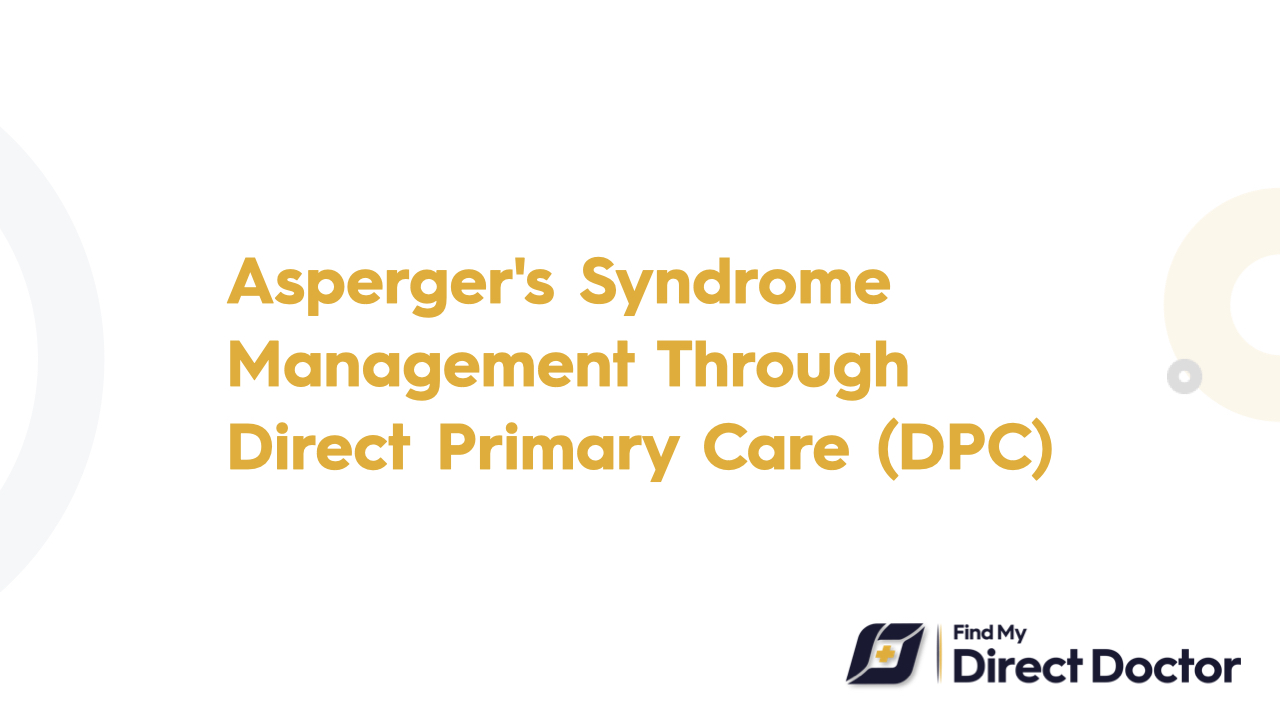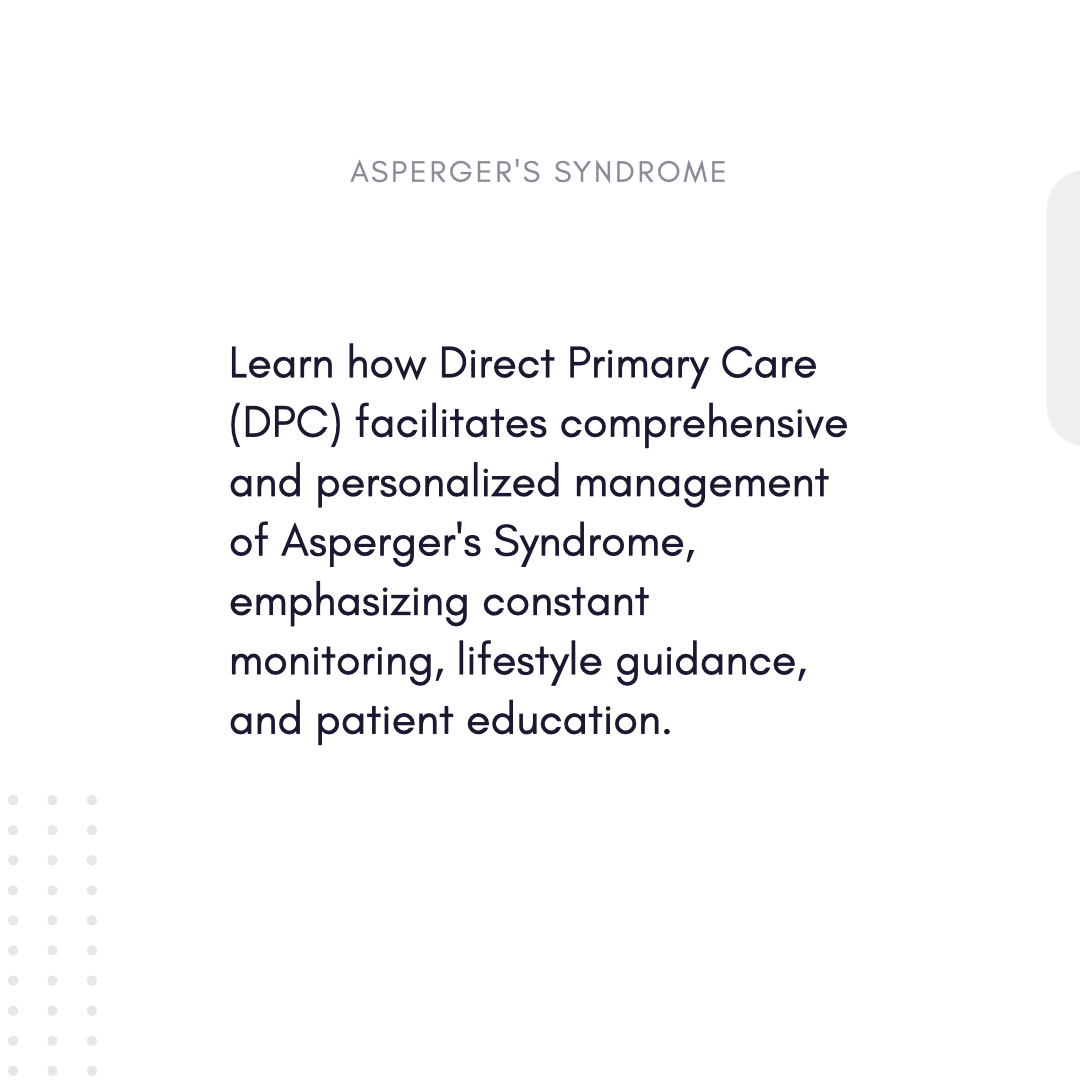Asperger's Syndrome and Direct Primary Care (DPC): Personalized Support for Neurodiverse Needs
Part of Autism Spectrum Disorder (ASD), Asperger's Syndrome is characterized by limited interests, sensory sensitivity, and social communication challenges. Handling Asperger's demands for tailored strategies addressing daily living, mental health, and physical fitness. Direct Primary Care (DPC) offers a patient-centered model by means of accessibility, continuity, and customized approaches that enhances treatment and helps people thrive.

Recognizing Asperger's Syndrome: Principal Challenges
Core Traits:
- Trouble with conversational reciprocity, eye contact, and social cues
- Keen focus on specific interests (e.g., coding, art, trains)
- Sensual awareness of textures, sounds, lights
Co-Occurring Conditions:
- Anxiety
- ADHD
- Depression
- Digestive disorders
Diagnosis:
- Clinical assessment anchored in DSM-5 criteria
- Often involving psychologists or developmental experts
How DPC Enhances Asperger's Management Style
Direct Primary Care (DPC) is a membership model (USD 50–150/month), with unrestricted access to a main care physician. For Asperger's patients, this means:
- Less stress from schedule changes; no waiting for appointments
- Open pricing: Labs, discounted specialist coordination, therapy referrals
- Complete treatment meeting medical, social, and sensory needs
Customized Theraputic Strategies
- Coach socializing abilities: Develop communication strategies with therapists
- Referrals for occupational therapists for sensitivity management aid in sensory integration
- Customizing treatment for co-occurring disorders including GI issues, ADHD, or anxiety
Routine Building and Continuity
- Build trust with a doctor who regularly interacts with you in line with ASD traits
- Regular appointments based on a plan help reduce anxiety
- Track over time regular development, diet, and mental health
Conversational Engagement with Professionals
- Developmental pediatricians: For constant ASD-specific guidance
- Mental health professionals using cognitive-behavioral therapy (CBT) for anxiety or depression
- Support IEP/504 plans for classroom changes
DPC's Benefits for Asperger's Patients
Improved Continuity and Access:
- Same-day or next-day visits and direct mail or text help remove barriers to treatment
- The idea of a "medical home" ensures consistent, orderly treatment between providers
Customized Method:
- Automobile Healthcare Accommodations Tool (AHAT): Create customized reports to improve patient-provider communication
- Sensory-friendly changes include low-light exam rooms, noise-cancelling headphones, and flexible scheduling
Reduced Healthcare Consumption:
- Lowering emergency visits and hospitalizations through preventative care
- Anxiety-reducing strategies like "happy visits" and pre-procedural videos
Specifically Asperger's Management in DPC
The American Psychiatric Association (APA) stresses individualized care for ASD. DPC uses:
For Children and Teenagers:
- Help parents engage with teachers to implement sensory changes and IEPs
- Deal with GI issues related to sensory preferences or picky eating for growth monitoring
For Adults:
- Advocate for remote work and quiet areas at offices
- Referrals to ASD-friendly social events or mentors help with social integration
For All Ages:
- Advice for sensory tools like weighted blankets, fidget toys, or noise-cancelling headphones
- Mental health: CBT for control of anxiety or emotional regulation
Real-Life Success Stories
Case 1: Ethan, 14, showed better classroom attention once his DPC doctor worked with his school to set up a quiet testing area and noise-reducing headphones.
Case 2: Lila, 29, used DPC's reasonably priced therapy and dietary advice to manage GI issues and anxiety, enabling her to flourish in her tech job.
FAQs: Asperger's and DPC
Q: Is Asperger's Syndrome something DPC could identify?
A: After diagnosis, a DPC doctor offers ongoing support; for official evaluation, they consult developmental specialists or psychologists.
Q: Does DPC run sensory-friendly clinics?
A: To help with sensory stress, many DPC clinics feature flexible scheduling and low-stimulus exam rooms.
Q: Does DPC cover occupational therapy?
A: DPC works with local therapists on discounted cash rates, though not part of the membership.
Why DPC Is Changing Asperger's Treatment Approach
- Builds confidence: Regular treatment under a known provider reduces anxiety
- Flexible care answers sensory needs and communication preferences
- One location addresses social, psychological, and physical health holistically
Accept Neurodiverse Ideas Using DPC
Asperger's Syndrome causes particular challenges, but DPC helps people and families find a partner dedicated to reasonably priced, compassionate, and customized treatment—enabling them to flourish in a neurotypical environment.






